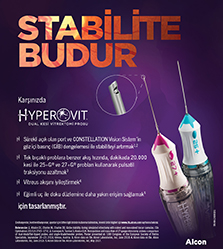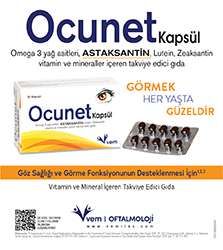2M.D. Special Kent Hospital, Eye Clinic, Kutahya/TURKEY
3M.D. Associate Professor, Medipol University, Department of Ophthalmology, Istanbul/TURKEY Purpose: To evaluate the efficacy and safety of intravitreal bevacizumab (IVB) injection in the treatment of diabetic macular edema (DME).
Materials and Methods: The charts of the cases who had İVB for DME were reviewed retrospectively, and the changes of best corrected visual acuity (BCVA) and central macular thickness (CMT) measured by using optical coherence tomography were analyzed statistically.
Results: Thirty-four eyes of 24 patients with DME who had IVB were included in the study. At the end of the mean follow-up time of 14.3±5.2 months, mean BCVA improved to 0.73±0.52 logMar (snellen: 0.2) from the baseline value of 0.99±0.59 logMar (snellen: 0.1) (p=0.0018). CMT decreased to 427±156 μm from the baseline value of 505±142 μm (p=0.0016). BCVA didn't change in seven eyes (20%).BCVA improved one or more lines in eight eyes (23%). In three eyes (8%), there was loss of one or more lines.There was ≥10% CMT decrease in 19 eyes (56%). CMT increased by ≥10% in six eyes (18%). There was no complication such as retinal detachment, vitreus hemorrhage, endophthalmitis which may occur after intravitreal injections.
Conclusion: It may be concluded that IVB is an effective and safe method in the treatment of DME based on our results. This method which has been gaining popularity by the time can be used as an adjunctive treatment to laser photocoagulation or as an alternative.
Keywords : Diabetic retinopathy,macular edema, bevacizumab



